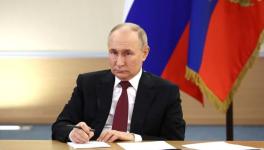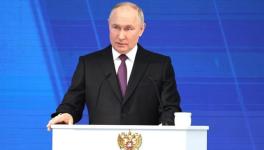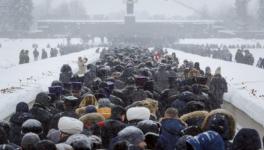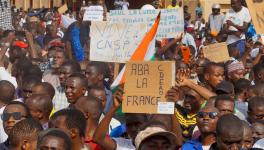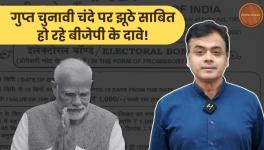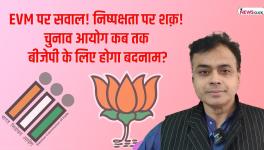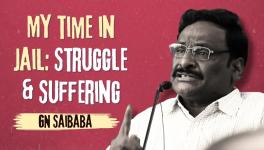Marcello Musto on Rise of the Radical Left in Europe and the Way Ahead
Newsclick interviewed Professor Marcello Musto who teaches Political Theory at the Department of Political Science of York University (Toronto) on the Left politics in Europe. The discussion also revolved around The Post-1989 Radical Left in Europe, the results and prospects. On the emergence of the Left in Europe, professor Musto believes that, “at a continental level, a real alternative is conceivable only if a broad spectrum of political and social forces is capable of fighting for and achieving a European conference on the restructuring of public debt. This can happen only if the radical Left develops, with greater resolve and consistency, a variety of political campaigns and transnational mobilizations. These should begin with the rejection of war and xenophobia”.
Rough Transcript (Part I):
Gautam Navlakha (GN): Welcome to Newsclick. Today we have with us Professor of Sociological Theory at York University, Toronto, Canada but an Italian Professor Marcello Musto with us to talk to us about political developments in Europe especially with regard to the Left movement. Welcome Professor Marcello.
Marcelo Musto (MM): Thanks. It's a pleasure being here with you.
GN: The first question I would like to pose to you is about the political scenario in Europe today. What do you think has dramatically taken place in Europe today.
MM: Well, I would like to start by explaining to people who are listening to us was that the political scenario today in Europe is dramatically changed compared. The idea of Europe that people were used to I don't know 20 years ago, two decades ago for example. Just to make some examples, we at countries like Italy, France, like Spain, like Greece where there was a very strong polarization of the votes of the political participation thinking about forces like socialist parties and and popular party in Spain or the Socialist Party and New Democracy in in Greece or the Central Left and Centre Right in France, in Italy. So these two parties or sometimes these two coalitions occupied at least 2/3rd of the political scenario and they got at least sometimes more than 2/3rd of the votes
GN: Your are talking after the post second war?
MM: No, I am talking about the last two decades as I said. Then later we can examine the period before. I am talking about the end of the Soviet Union and new political scenario that started with it era. So the end of the Communist Parties. This bipolar organization of politics in this countries but you know we could say the same about Scandinavia where social democracy was very strong or United Kingdom eventhough there is Labour party but conservative and Labour party occupy the space. So the new phenomenon, I would like to start from this point that there are new forces that emerged intopolitical situation of the Europe today. In this new forms emerged in particular I would say after they became in particular after the beginning of the economic crisis where the crisis in United States in 2007 and 2008 arrived to Europe and then later perhaps we want to talk about the role the European Union have in this economic policy etc. So in order to go back to the first part of your question now, we have a political situation in this countries, the countries where there are no longer only two big parties but there are new forces. In these forces in some countries are new moments that did not exists before, make the example of the five star movements for example political party in my country. The first time there they went to the election they became immediately the first party of the country which is something unbelievable to conceive even ten years ago because Italy has this long tradition of the Christian Democratic Party and the Communist Party, as I told you they had more than 30% of the vote. It has been time this after the end of the world war two. I could make examples like countries like in Spain, National Front in Spain or the famous case of Syriza in Greece. So in order to overview this situation and complete my answer I would say that there are new different forces that emerge in the past years and that collapsed a little bit the political system that exist before. Now, it is now longer Centre Left and Centre Right but sometimes, there are new parties, new political formations. Sometimes Radical Left, sometimes far Right movement, Noe-fascist movement sometimes, some other time populist new demagogic movement for example the case of UK in England they already existed before but they became stronger in the past years and they were the first party in the European elections in 2004. So these new forces created a new political scenario that I want to repeat this again that it was unconceivable a few years ago.
GN: What do you believe is the reason for this collapse of this bi-partisan dominated politics. Or let me put it, add also, this is indicative of also crisis of the ruling classes.
MM: Let's start with the first part of the question. What created this? First of all the crisis in 2008, they started in 2008 and later became even more complicated in particular for many countries of Southern Europe. Now, there is a debt issue that is very strong and very well known. I am not going into this now. But there is an economic situation now I better give some numbers, sometimes it is boring but I think people should think about this. We have a rate of unemployment in countries like in Greece and Spain that reached one quarter of the population. We have a rate of unemployment in countries like Italy, Portugal or France between 12%-17%, 11% so we have an incredible dramatic phenomenon of more than one million young people between 18 and 29 years old leaving Italy, Portugal, Spain and Greece. From these four countries, in case of Portugal, we know there are at least 400,000 young people between 18 and 29 that left the country after 2008. I am talking about small country like Portugal I am talking 400,000 people is huge part of the population. Where did they go. They go in Germany, in England, sometimes when they have very strong qualification they went to get a job outside. This is also a case for Italy you know all this people who became important Professor or working as Doctor, they found the resources to do this and on the other course of Atlantic, North America of course. So you have a very dramatic change in particular a change for the new generation. I would like to stress this sbecause this new generation for the first time after world war 2, they live in worst condition. They have to work now 7 days a week when they get a job when they are likely to get a job. They take 2-3 different jobs so precarious jobs, flexibility is everywhere. No talking about dramatic situation which is the attack to social welfare because in the past 20 years, not only in the past 7-8 years after the crisis but in the past 20 years, the European models has been attacked has been changed dramatically in many places, including in Scandinavia where you know, the flag of social welfare. So there is a dramatic economic change in this situation has generated issues in the society and also the need for new responses. But I would say that the more important reason for the political changes that we have discussed so far is that the fact that these two alliances, these two poles the Centre Right and the Centre Left they have been following more or less the same kind of economic policies. So I don't want to say Liberals and Socialists are the same. I don't like to say that the all decades in the night are black. NO. want to be very careful with this. But we can really say that in the past years the policies of the Centre Left became extremely Liberal and they followed all the things that they were fighting 20-25 year ago. I want to contextualize this giving some references for our audience. I am talking about Tony Blair and the Ted in the Labour Party. I am talking about Shrodum in Germany, I am talking about radical changes that destroyed the last presence of social democracy in this part. Perhaps, the only exception to this is ---- -- in France with plural Left but also in this case they were defeated, the form of 35 hours work in one week. So in this period, the Centre and Left is doing the same politics of conservative or Christian Democratic Party. The policies that are imposed by the European Union from the so called Troika and there are no differences. I mean why should I vote for the socialist party, the Centre Left if actually there are those who follows more the policies of Liberal. Let me say something about if I may about the Eastern Europe because Eastern Europe generally is not considered in the debates about Europe. We are talking about many millions of people. Look at the case of Hungary for example or Poland where the socialist parties introduced this austerity policies against the social welfare and these policies generated the social disaster that happened in the past years. And today, what do you have in these countries. You have a fascist government in Hungary. You have an extremely conservative Right wing, far Right wing government in Poland. By the way first time the parties taking the full majority at the election after 1989 after the end of the so called actually existing socialism and of course there is no way for the Left to open a discourse to have credibility with the workers with the which Europe is facing now.
GN: I think this is a good point to come to an issue which you have dealt with extensively in your writings which is what and how was Left impacted in Europe by the collapse of the Soviet socialism in 1989 and what has been the political trajectory of the Left since then. I think it would be very interesting for our viewers to know that.
MM: Yes, it is a big topic this one only for interview, I will try to give some references. In 1989, there is an epic change, there is a serious change in European policy of course at the end of the Soviet Union, the end of so called socialist regimes of the eastern European countries including German Democratic Republic and it is the end of the Communist parties. The big Communist parties were so strong, so important in political life of countries like Italy, France, historically, the Communist party was around one fifth of votes of the electoral body. So after this period, after this change the majority of this parties you know some of them already started to take some distances from Soviet Union with Euro Communism which was a moderate, a reformist project started in Italy with -----later followed by ----------Spain etc. so the majority of these political forces they joined the social democratic family and they went into this group today called a group of this Socialist and Democrat which is you know in European parliament the group were historically you find the parties like Socialists in France, German social democratic party etc. In Italy, this is the case. The majority of the CPI of the Communist Party, they changed names, they founded new parties, the Democratic Left Party which later became the Democratic Left because when people want to distance themselves political organisations and then this Democratic Left became later the Democratic Party following this idea of Clinton of United States. This is what happened with Romano Pradi in Italy the same time the Blair was doing the new Labour Party. So there is a very strong difference with the Communist Party. A difference not only in terms of social policies but I am thinking about another Dramatic event that we have to consider when we talk about Europe today. The fact that this party participated to the war in Yugoslavia in 1998. The Prime Minister in Italy gave Italian bases to attack former Yugoslavian country was the former leader of the Communist Party and I am thinking about the participation in Afghanistan, participation in Iraq we should see some parties were in favour, some were in favour but there is a big change. So only one this small part of the old Communist parties remain try to reorganize in a very difficult times because these are times where no-liberalism is a mantra, the famous sentence of Margaret Thatcher there is no alternative. In this dramatic scenario, in France, in Spain, in Italy, in Portugal, in Germany later to there is a sort of attempt to reorganize the Left. Sometimes this attempt has been positive and this partIes achieved 8 to 10 percent, 7-10 percent of the votes. Sometimes it is very difficult to open a discourse, to open a space for the Left in these countries because I am also talking about a Labour movement that is changing and most of them talking about unions are no longer representatives of this millions of workers it was in the past, in the 60s, in the 70s the golden age for the Left in Europe and I am also talking about of the difficulties for social movements to reorganize in this new complex political scenario. So these are some changes that happened immediately after the fall of Berlin wall in 1989.
Rough Transcript (Part II)
Gautam Navlakha (GN): You mentioned also both the sSocialists and as well as Communists suffered enormously as a consequence of the collapse of the Soviet Socialism and they were also increasingly they moved Socialists more than the elements from the Communist Party moveowards accepting or adjusting cohabiting with neo-liberalism. Simultaneously you also pointed out that post the crisis 2007-2008 there is another phase of Left consolidation that has come about. Would you take us through that?
Marcello Musto(MM): The first point is very interesting for me. I tried to repeat as much as I can. So if you look at the Communist Party of 1989 of course, they were destroyed sometimes they were taken out of political scenario and in some cases, the beginning of the 90s, the Social Democratic forces they gained more strength because some part of the Communist Parties they joined this political spectrum, this political parties. But later and you can see this very clearly in what happened in the past years this socialist party also suffered a lot as you said by neo-liberalism because in the end by accepting in folds sometimes these policies, this sometimes the ruling classes because you asked me about this they also tried to use this Centre Left government because they knew that one thing is doing what they call reform but actually we are talking about counter reforms social life and social welfare in Europe. One thing is you do this with the Right Wing government think about Belusconi in Italy Adnar in Spain or Chirac Sarkozi in France. One other thing is this reform which I call counter reforms are organised by Centre Left government with strong ties with trade unions. So this is sometimes, the better way, softer way to introduce almost all the demands of the ruling classes. But without general strikes, without too many conflicts in the society this is what happened. But as a result of this later, there was a lack of confidence in Socialist Party or Social Democracy as I said in the beginning of our conversation. If you look at the map of Europe today, you will find no longer socialist parties in Easter European countries you will find a dramatic change in Scandinavia in the North of Europe where the Social Democratic Parties were in power for 50-60-70 years and has been at ithe opposition of Right wing, very conservative government in the past ten years, this is also a very big change. This is also a very significant change. Even in Scandinavia, even in countries like Sweden for example, there is a big change and it is also through in Europe, it is also through when you look at the crisis of Socialist Party in Greece completely disappeared if you look at the crisis of the socialist party in Spain where they lost a big part of their electorate. If you look at all the countries, you look at the ridiculous change made by the German Democratic Socialist Party this is now Merkel party you could not see any differences. So even if you compare this with the time of Gerhard Schröder who was in power for 7 years – 8 years, there is a dramatic change and in the end following this neo-liberal policies in my opinion is been a big mistake and then reason for the political defeat of Socialist Party. Now I guess you want me to bring back me to the other part of the question, the one about Radical Left. So what particular you want me to?
GN: Given the setback suffered by Left in 1989 given that they remain marginalized for so many years or decades or more how has the radical Left tried to re-emerged from the ruins left behind with the collapse of Soviet Socialism and what are the various alternatives that are being tried out?
MM: So that's a complicated question. I will try to be short. I will try to answer this question in two different point of views.
GH: May I interrupt. The reason I am posing this question is because of a very interesting reference you have been in your writings what you call the plural model. So I like you to come to that by tracking the history of this development in order to realize it's significance today.
MM: I will. This is the second point I would like to touch the organizational questions of the radical Left in Europe. But before going to this point, I have to mention the another one a small political, which is related to the attempt of this party something about re- foundation of Communist Party, Italy, I am talking about the PCF, the French Communist Party. In France I am talking about either Left in Spain, in the 90s between the second part of the 90s and the beginning of the millennium they all supported, sometimes with the presence of the mainstream government, sometimes just supporting the measures of the laws in parliament they all supported Central Left government. And this Central Left government were not government was not the government that were doing progressive political reforms I am talking about this kind of socialism of social democracy following the neo-liberal agenda in the 90s. So in the end, this participation in thisgovernment, this support to the government has attacked the credibility of these forces. And if you look at the result of these parties after they supported the Centre Left government you will see dramatic defeats in the case as well. You will see party like Refoud.... in Italy fore example they had 8.5% of the vote or the Communists in Spain but after the support to the government, the situation changed dramatically and still today in some countries, the case of Italy, the country where I was born for example, the Left is still trying to recover this support and this new complicated political scenario that I tried to describe in the beginning of our conversation. Now, in these circumstances I would say that the model that I started with Spain or Portugal if you want which is this plural model now the idea that the Communist Party will try to join or merge with other organizations of the Left sometimes in one unique political organization one party. Sometimes leaving their parties their existences, their independence but going together to the elections and having sort of annual assembly where political project is debated, discussed etc. this model that started in this period with the end of the Soviet Union experience is now was the dominant model. If you look at the country per country, the situation of the radical Left today you will find besides some exceptions like the Communists Party in Portugal or the Stalinist Conservatives I would say Communist Party in Greece, you will find country per country new formations, new alliances of the radical Left that bring together the different forces that existed at the time. The example is ---Portugal which is now the third political force of Portugal more than 10% of the vote. The example is the Left Front in France which is now in crisis again but was very strong a few years ago. The example is Syriza in Greece and many many other. In every country, in every European country literally now you would see this attempt to merge together the forces of the radical Left. Sometimes with Trotsky's background, sometimes background related to the classical Communists Parties of the 20th Century. Sometimes also new social movements that brings new contradictions like all the ecological movements that no longer trusts in Green Parties because this Green Parties later said Centre Left or Centre Right is the same and they established alliances, they supported conservative governments which has nothing to do with ecological policies etc. so you see this conglomeration of forces, in the case of Syriza is the most famous one. I believe this is the trend that we can take for dominant trend for the coming years. So the plural Left as you said.
GN: Does this mean the monolithic structure of the parties earlier have now given a way to more democratic organizational form which also addresses the issues as a consequence of the collapse of the Soviet Socialism.
MM: This definitely means that the model that we know, the democratic centralism, the model of the Communist Party of 20th Century is no longer the reference for the radical Left in the radical Left in Europe. But the question of more democracy, more participation is not an easy question to answer. And I also don't believe that this essential question can be addressed merrily in the political parties because the first need for the Left today not only the Radical Left, I would say the same for Social Democratic and Socialist Party is to change this model, to sweep this tendency of non participation of anti-politics. Things that I also mentioned little bit before. The first problem today is this sentiment of feeling of being against politics. Politics is the same, there are no differences Left and Right there is no distinction. This is very strong in the many the new populist forces that are becoming so strong, so significant in Europe. As well as the Radical, the Far Right forces. So this is the first question. Then, if this model is going to bring more participation. I don't know take for example the case of Syriza. Syriza being a not capable to debate to discuss the things that happened this summer, the dramatic things that happened in the conflict with the European Union, the crisis of June-July not even in their party merging outside with Social Movements and all those protests that characterized the countries in the past years. So I look in a positive way this change this pluralistic model but I don't believe that like many parties and movements say today. There are many, take for example the case of Pirots party in Sweden and Germany that there is this participation of people using the web, you do one click when you add it on and this is the real democracy. To be sincere, to be someone that know little bit history of labour movement , well, having a political party, having an organisation where millions of people used to meet used to discuss, used to decide together is something that Utopian today for this kind of political groups and parties, because we are talking about a different era, we are talking about at least 3 decades of passive revolution of Antonio Gramsci and I will not say I will answer in a negative way. that there is more participation, there is more democracy than 20-30 years ago. But this way, the plural model in my opinion is the only possible way to merge this forces and all these forces not fighting each other but trying to develop an agenda participation of social conflict which is the thing that we need most. So if I may answer this question it is important to have a plural model, to have this wide participation of many forces as possible. But this question is once again political programme of the party is once again the direction this party want sto go is once again the question the democratic force, the democratic model that see the participation of thousand and thousands of human beings in this organization and then hopefully, millions of people in their country. The question is how we reorganize again, how we rethink again an alternative model for Capitalism. So the discrimination point of this parties of this formations of this alliances should be anti capitalism. Should be a very long complicated part that radical Left has to rebuild again
GN: Marcello, before conclude this just want to take you to link up your answer right now, in view of your fact that you also mentioned that the rising absenteeism from people participation in election to as you mentioned, people's reluctance, I mean popular perception is that all politics is same to neon-populist movement and particularly the right of far right and neon-fascist movement in Europe. What lessons has the Left both for the collapse of Soviet Socialism as well as the mistakes which they committed post that period till economic crisis of 2008 and have they understood the significance of that?
MM: This is a very dangerous question because we could talk about this for hours. I will just try to say that the far right parties, the far right movements, ideologies are those who have taken more advantage of the crisis of 2008. if you look at the political scenario in Europe today I have already mentioned about this little bit in Eastern Europe. But we mentioned the case of National Front in France, the first party at the recent general election and the recent municipal election something unconceivable three years ago. Let me take again the example of Scandinavia where you have neon-fascist movement. Sometimes, it is very important to see because the name of this party have nothing to do with this. We have a party, in Sweden the name if Democratic Party but this is an organization founded by neon-Nazi movement that couple of decades ago that became strong today, now if you look at Norway, if you look at Finland, if you look at Denmark, this party are the second or the third party in the country sometimes more than 20% of the vote. Sometimes being in the government. So it is the clear example of the how much the far right has gained in the past years. But, also going on little bit beyond the analysis of the political parties which is the core, the focus of the interview today. But also if you look at the changes and the consciousness of the European population look at this dramatic evidence and the response that the people have given to the crisis of the refugees or the crisis of people who migrated from other countries, from middle east from Africa. So there is a very strong perception of racism in European society because of course this is coming at the time of this dramatic economic crisis and changes I tried to describe in the first part of our conversation, so this is something that we have to keep in mind and it is something very dangerous we have to see where it is going in the next years. The other part of your question..
GN: My point is that obviously, where they have been able to capitalize on the fall out of the crisis in Europe, the far Right. The Left, whey is it they have not been able to capitalize the anti-capitalist politics which they pursues which is also very necessary because this is also a point that you have made repeatedly in your writings, that compromises that the socialists and the Left made giving in to the capitalist on the one hand and neon-liberals on the other.
MM: Well, in my opinion perhaps I said too quickly because this result of the of 1991 or 1989 this was the victory of the Capitalism over socialism. Even-though this so called socialist model in my opinion has very little to do with the Soviet Union and regimes of the Eastern Europe. This was exactly the victory over socialist, over labor movement. So these forces were literally in a corner at the beginning of the 90s and these years with this new different scenarios not only political, I mention for example the trade union, there is also a lack of confidence in the trade unions but there is also a form of labor that is dramatically to change as you know very well. So it is complicated for the Left to rethink, to reorganize, to rebuild because sometimes you also have to respond to this complicated questions try to avoid that these counter reforms in the society will hit even more the working class or the poorest strata of the population. So you think, whether or not it is possible to achieve something in this coalition with the Centre Left which is perhaps what some political parties try to do in the 90s but there was no way that they got something significant and to the contrary, they were forced to support some of the measures they were opposing, they were strongly opposing before. So it has been a very complicated part, very difficult part and the other things to consider is that all this is happening under this big umbrella of the European Union, this Umbrella, this oppressive that does not allow country to break these impositions of the Troika. So it is a very difficult time and the next year would be difficult as well.
GN: Thank you Marcello. It was really pleasure and Thank you for this.
MM: Thank you for the invitation and I hope I will be back soon.
Get the latest reports & analysis with people's perspective on Protests, movements & deep analytical videos, discussions of the current affairs in your Telegram app. Subscribe to NewsClick's Telegram channel & get Real-Time updates on stories, as they get published on our website.









